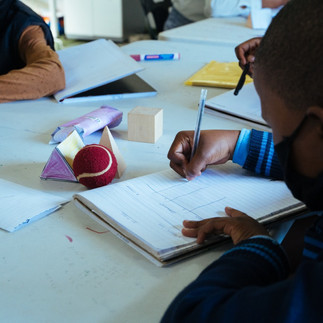Axium’s Masakhane programme started in 2012 to offer additional after-school English and Mathematics lessons for grade 6-9 students. This year, Masakhane has shifted to work with learners from grades 4-7. This is the first time at Axium that we have been able to dive into grades 4 and 5 in our after-school programme offering which we are very excited about.

Grades 4-5 in South African schools are an extremely pivotal time in a child’s education journey as during these years they are expected to transition from learning in their home language to learning in English. For students in the rural Eastern Cape in South Africa, this means they begin their schooling by learning in isiXhosa from grade R-3 and are then required to transition into an English curriculum for all subject areas in grade 4.
The general lack of infrastructure and basic services in the area impacts the exposure students have to English as many are unable to access English books, television, internet, newspapers, magazines and radio. For the majority of learners, English is considered a foreign language.
“Imagine, no English exposure for your first four years of school and then boom all of the sudden all your learning resources are in English,” Sinovuyo Mcunukelwa, Masakhane Programme Manager, commented.
On paper, English is the medium of both teaching and learning. However, in practice this is seldom the case as teachers are aware that, if they did teach in English, their learners would not understand. As a result of these language barriers, learners quickly fall behind in literacy and numeracy in their early grades. These weak foundations set them up for a future of playing 'catch-up' which has a detrimental effect throughout their schooling careers.
Sinovuyo explains, “This is why at Masakhane, we prioritize bilingual learning. A strong foundation in your home language is crucial for learning another language; you can’t just strip a student from their home language.” Maskhane aims to create a fun, safe, learning environment in which students are supported in their home language as they develop their English and Mathematics skills, in order to build strong foundations to set them up for success.
The Masakhane team has fully embraced this experimental space this year and has piloted many initiatives, using games and individualized, targeted work materials (online and offline) to develop students’ basic mathematics and literacy (English and isiXhosa) skills. These initiatives have included incorporating Teaching at the Right Level (TaRL) methodology, using a mathematics tablet program called Greenshoots, exploring Fundza courses, prioritizing and empowering parents to engage with their children’s education and partnering with the local Zithulele library.
The name Masakhane means let’s build each other. Sinovuyo explained that this name speaks to the core of what her programme aims to do. “This is the basis for involving parents, for partnering with local schools, for having staff from this community on our teaching team. Through all of us working together, we are building one another and helping children learn.”








Comments